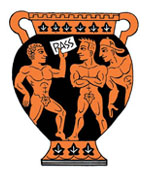To read our
exclusively online On the Campus column, click here.

December 17, 2003: On the Campus
 |
|
Illustrations by Ron Barrett |
Keeping it social: Members only
On a recent Thursday night, a freshman muscled through the mob in the vestibule of Ivy Club and got as far as the bouncers, Justin and James.
“Got a pass?” James asked.
“I’m an S.A.E. pledge,” said the freshman, referring to his fraternity, Sigma Alpha Epsilon. “I’m in S.A.E.,” he repeated. “Let me in.” Justin and James stood firm, but within seconds an S.A.E. brother appeared out of the dancing throng, waving a pass. “Go ahead,” he said to his pledge; then he nodded to Justin and James.
Princeton’s first fraternity appeared in 1843. Twelve frats and a decade later, the trustees and faculty adopted a resolution requiring each new student to forswear secret societies, as fraternities were referred to. Some illicit groups lingered for decades, but President McCosh had them eliminated from campus in 1875.
On April 18, 1983, according to the Daily Princetonian, the Trustees lifted their prohibition on students joining Greek organizations, but reaffirmed their opposition to those groups. Today, 15 unrecognized fraternities and sororities claim more than 700 undergraduate members.
“You get to Princeton and there’s this really convenient way to get to know a bunch of older guys and hang out with sorority girls,” says Rob Hulick ’04, a member of Kappa Alpha Order. “You feel a certain obligation to follow your instinct to instantly achieve some sort of social status.”
Despite the growing popularity of Greek societies at Princeton – including the recent arrival of three historically African-American sororities – President Tilghman has not modified the school’s no-recognition policy. Rush parties for most Greek groups begin before classes do, so freshmen feel pressured to join before they’ve become comfortable on campus, according to Tilghman. “What you’re doing is really quickly narrowing down the space that you’re going to explore,” she said during a meeting of the Undergraduate Student Government last spring. And certain Greeks have gotten cozy with certain clubs, fostering an atmosphere of social exclusivity that Tilghman finds abhorrent. “It . . . worries [the Trustees] because there is the added perception that sororities and fraternities are acting as a feeder for the eating clubs,” she said.
The Greeks don’t deny Tilghman’s statement. “Most fraternities have certain clubs that they’ve staked out as their own,” says Hulick.
Whether or not Greek affiliation equals eventual club membership it will, without fail, get you through the Thursday-night throng and past Justin and James at the Ivy Club door.
In a scene from the film A Beautiful Mind, John F. Nash Jr. *50, then a graduate student, abandons his nightly studies in style. Throwing his arms in the air, he marches out of a wood-paneled library roaring, “I respect beer!”
Where the film gave Nash a well-lit pub with pool tables, a jukebox, and a long, curved counter at which to respect beer, Princeton really supplies its master’s and doctoral students with Debasement Bar – a gloomy shoebox located in the basement of Pyne Tower.
But even gloomy shoeboxes have their allure, and this one has started to attract undergrads unhappy with the eating clubs. “By the time senior year comes around there really is nothing new to be discovered at the Street,” says Chris McKallagat ’04. “The D-Bar is like discovering a new eating club full of quirky, interesting, brilliant people.”
 On the busiest
nights of the week – Thursday, Friday, and Saturday – bouncers
man the door. As a private club, the D-Bar is open only to residents of
the Graduate College and affiliated residences. Nonresident grad students
must purchase a $10 membership card; undergrads must get club members
to sign them in as guests.
On the busiest
nights of the week – Thursday, Friday, and Saturday – bouncers
man the door. As a private club, the D-Bar is open only to residents of
the Graduate College and affiliated residences. Nonresident grad students
must purchase a $10 membership card; undergrads must get club members
to sign them in as guests.
Serving up good, cheap drinks every night from 10 p.m. to 2 a.m., the D-Bar usually buzzes (especially during Tuesday night karaoke), but on a recent Sunday no doorman was there, and except for the bartender and a lone barfly, the place was empty.
“On an average night, it’s like the U.N. General Assembly,” says Chris Julliard, an Italian pursuing a Ph.D. in economics. “All I know about baseball, I learned from an American friend lecturing to me on this topic here.”
Undergraduates enjoy spying on these would-be preceptors, who, says bartender Amber Post GS, are “passionate about what they do.” That passion makes for rich conversation — a rarity on the Street.
“At the D-Bar people want to talk to you about literature, art,
quantum mechanics, etc.,” explains Nicole Oncina ’05. “And
you’re still getting drunk. Enough said.” ![]()
Andrew Romano ’04 is an English major from Medford, New Jersey.
On the Campus Online: Go to www.prince-ton.edu/paw to read “Defining life: In ethics, and in careers,” by Lauren Turner ’04.
